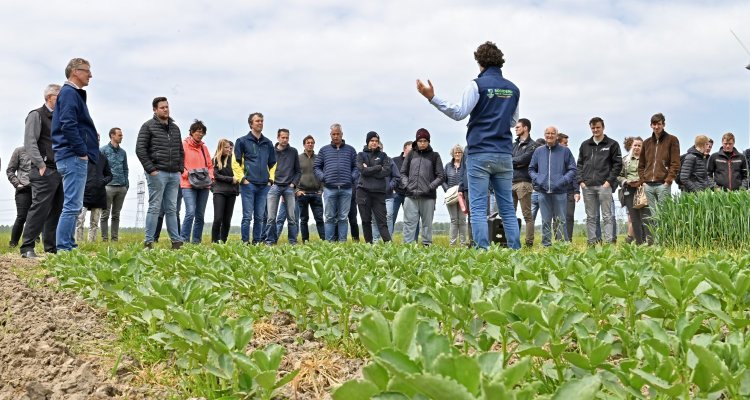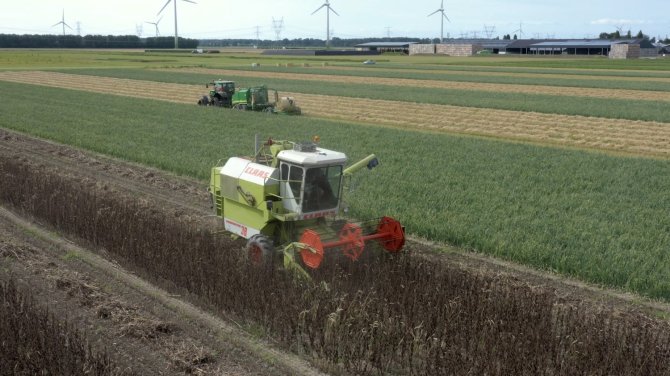
News
Farm of the Future Fourth Anniversary: helpdesk for agriculture
The Farm of the Future has become a household name in the agricultural sector. The field lab in Lelystad, which seeks answers to current and future challenges within the domain of agriculture, is part of the Farm. ‘Some of the solutions appear promising, but there are also some setbacks’, says project leader Pieter de Wolf. After four years of research, experiments and demonstrations, the first stage of the project has come to a close, and it is time to take stock. ‘The Farm of the Future aims to provide honest information and enter into a dialogue with farmers and other parties within the Netherlands and abroad.’
The Farm of the Future is located on the fertile soils of Flevoland, surrounded by wind turbines, flower strips and extensive arable lands. The testing location was constructed four years ago on a plot of land pertaining to Wageningen University & Research’s Field Crops division in Lelystad. The location was to serve as a source of inspiration for circular agriculture. The project is a partnership between Wageningen University & Research, Flevoland Province and the Ministry of Agriculture, Nature and Food Quality. Many people associate the Farm with strip-tilling, a cultivation method for growing crops in narrow strips. But it is much more, says De Wolf. ‘We use special driving tracks, circular fertilisation, a greater variety in crops and robots.’

Lessons learned
A wealth of experience has been generated by combining innovative solutions over the past few years. ‘We see that strip-tilling positively impacts biodiversity in general because food and shelter are provided throughout the year. This is reflected by the number of birds. At the same time, we also offer shelter for mice, which cause damage to the potato and carrot crops.’ The key lesson is that each solution has advantages and drawbacks.
The same applies to the system of vehicle tracks. This system positively impacts the soil structure and reduces the need for tillage. However, it has also made clear that agricultural machinery is ill-suited for this system. A track width of 3.15 metres is not all that suitable for farmers using their farming vehicles on public roads.
We tend to forget that the current farming system is the result of decades of development and optimisation
‘It always takes several years before a new application becomes effective’, says De Wolf. ‘We tend to forget that the current farming system is the result of decades of development and optimisation. We deploy an innovative system, and it takes time to develop it. In the coming years, we will continue to develop and test all manner of solutions, and we will continue to share our successes and failures.’
Fighting polarisation
The Farm of the Future has played a key role in the dialogue on the future of agriculture in the last few years. This is a highly polarised topic, with much distrust and with everyone having their own facts. ‘We know it is difficult, and there is much uncertainty and negativity within the farming sector. Moreover, those who are not part of the sector have no trouble voicing their opinions. We want people to leave the trenches and start a dialogue’, says researcher Marcel Vijn. A total of over six thousand visitors were received in Lelystad in 2022 and 2023.
After four years, it has become clear that the Farm of the Future project in Lelystad will continue with a few adjustments. ‘We will address these with a group of young farmers from Flevoland in the coming months’, De Wolf says. Farms of the Future will also be launched in a few other regions. A Farm will be started on the peat lands of Valthermond. And plans are well underway for Farms of the Future on several locations in the South-Eastern Netherlands. ‘The issues in the peat lands differ tremendously from those in Flevoland. Every region and soil type has its own challenges and requires different solutions.’
Visit the Farm of the Future
The guided tours of the Farm of the Future in Lelystad will continue for a while. ‘All are welcome’, says De Wolf. ‘Our goal is to make agriculture more sustainable, which is a lengthy process. However, when I look at where we are now, I have faith in the future.’